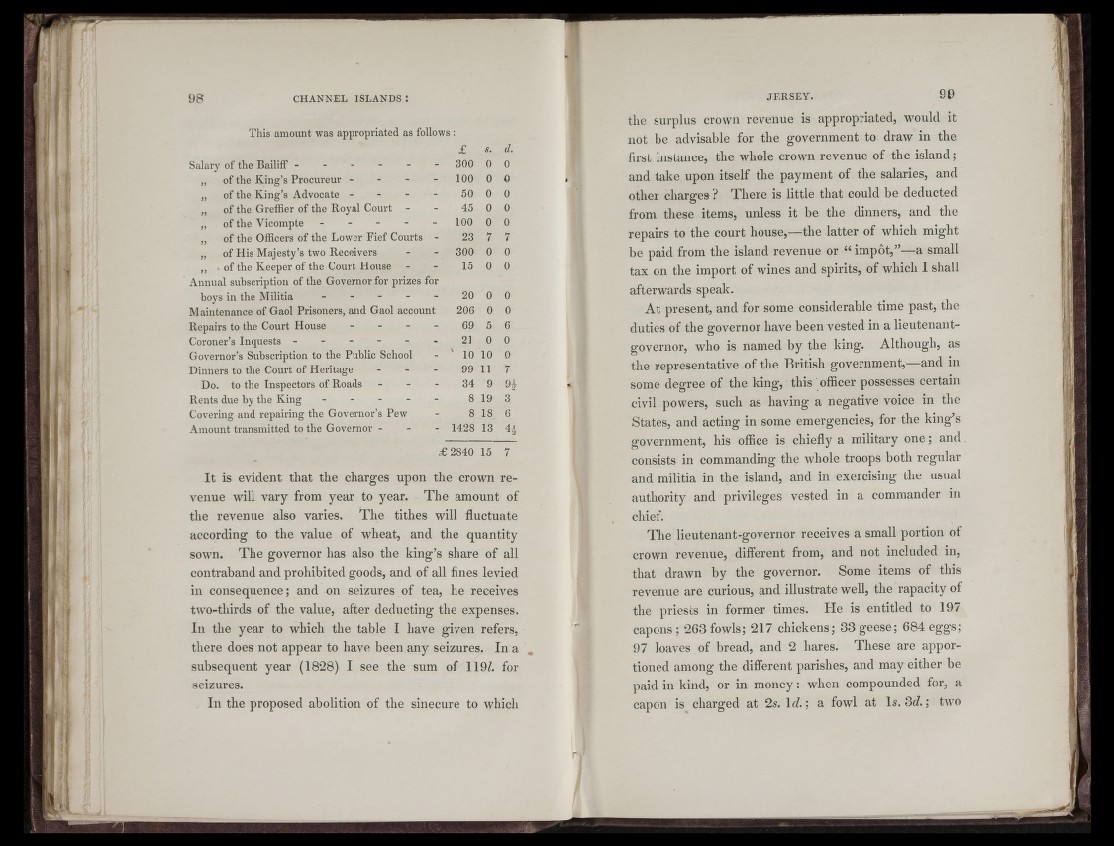
Ç
J
K . t
W I !
Tliis amount was appropriated as follows
Salary of the Bailiff - - - - - -
„ of the King’s Procureur - - - -
,, of the King’s Advocate - - - -
„ of the Greffier of the Royal Court -
„ of the Vicompte - - - - -
„ of the Officers of the Lower Fief Courts -
„ of His Majesty’s two Receivers
,, . of the Keeper of the Court House
Annual subscription of the Governor for prizes for
boys in the Militia _ - - - -
Maintenance of Gaol Prisoners, and Gaol account
Repairs to the Court House _ - - -
Coroner’s Inquests - - - - - -
Governor’s Subscription to the Public School
Dinners to the Court of Heritage
Do. to the Inspectors of Roads
Rents due by the King - - - -
Covering and repairing the Governor’s Pew
Amount transmitted to the Governor -
£
300
100
50
45
100
23
300
15
20
206
69
21
5. d.
0 0
0 0
0 0
0 0
0 0
7 7
0 0
0 0
0 0
0 0
5 6
0 0
- ‘ 10 10 0
99 11 7
34 9 9J
8 19 3
8 18 6
- 1428 13 4.1
£ 2840 15 7
It is evident that the charges upon the crown revenue
will vary from year to year. The amount of
the revenue also varies. The tithes will fluctuate
according to the value of wheat, and the quantity
sown. The governor has also the king’s share of all
contraband and prohibited goods, and of all fines levied
in consequence; and on seizures of tea, he receives
two-thirds of the value, after deducting the expenses.
In the year to which the table I have given refers,
there does not appear to have been any seizures. In a
subsequent year (1828) I see the sum of 119/. for
seizures.
In the proposed abolition of the sinecure to which
the surplus crown revenue is appropriated, would it
not be advisable for the government to draw in the
first instance, the whole crown revenue of the island ;
and take upon itself the payment of the salaries, and
other charges ? There is little that could be deducted
from these items, unless it be the dinners, and the
repairs to the court house,—the latter of which might
be paid from the island revenue or “ impôt,”—a small
tax on the import of wines and spirits, of which I shall
afterwards speak.
At present, and for some considerable time past, the
duties of the governor have been vested in a lieutenant-
governor, who is named by the king. Although, as
the representative of the British government,—and in
some degree of the king, this officer possesses certain
civil powers, such as having a negative voice in the
States, and acting in some emergencies, for the king’s
government, his office is chiefly a military one ; and .
consists in commanding the whole troops both regular
and militia in the island, and in exercising the usual
authority and privileges vested in a commander in
chief.
The lieutenant-governor receives a small portion of
crown revenue, different from, and not included in,
that drawn by the governor. Some items of this
revenue are curious, and illustrate well, the rapacity of
the priests in former times. He is entitled to 197
capons ; 263 fowls; 217 chickens; 33 geese; 684 eggs;
97 loaves of bread, and 2 hares. These are apportioned
among the different parishes, and may either be
paid in kind, or in money : when compounded for, a
capon is charged at 2s. Id.; a fowl at Is. 3c/.; two
it